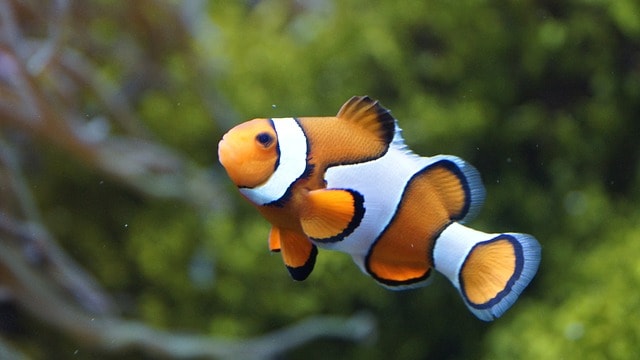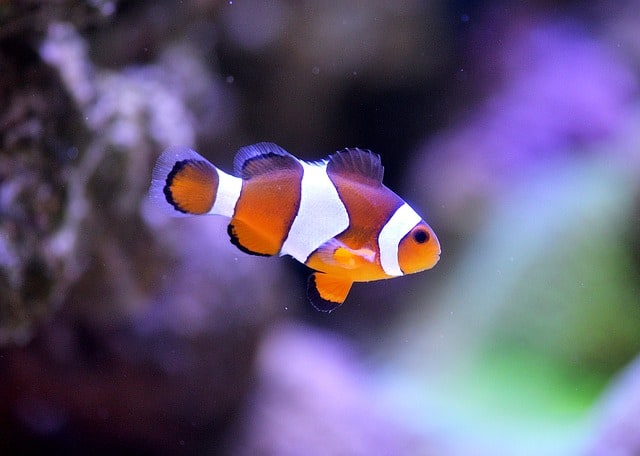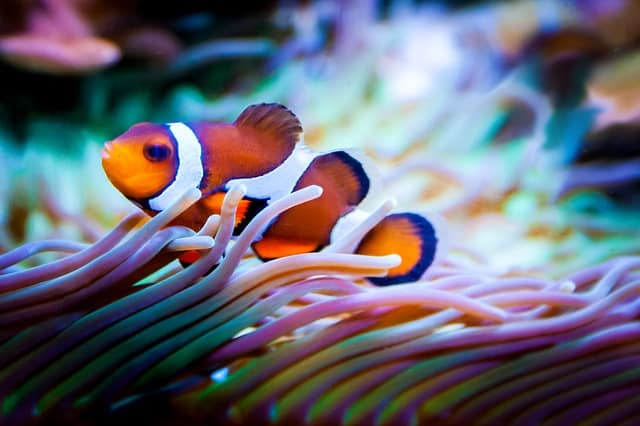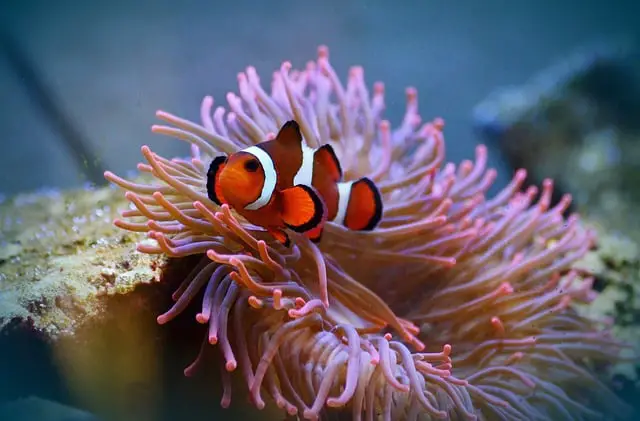Lionfish are a carnivorous species native to the tropical waters of the Indo-Pacific. Currently an invasive species in the Atlantic as well, this unique, brightly colored, and impressive-looking fish is a long-time favorite among aquarium hobbyists. Highly aggressive with very few natural predators to speak of the question remains: can you keep lionfish in a reef tank?
The answer is yes – you can keep a lionfish in a reef tank with corals. The problem, however, is that they’re a predatory fish and will devour small algae-eating fish as well as shrimp, crab, snails and other invertebrates that help keep the tank clean and the corals thriving.
Now that you know lionfish are considered reef-safe, let’s explore this illusive fish in more detail. I’ll explain how it behaves in captivity and whether it should be kept alone or with other lionfish. I’ll also discuss if they eat coral in a reef tank, what (if anything) can live peacefully with lionfish and how to properly care for them in captivity.
So, if you’re ready to ‘dive deeper’ into the aquatic world of the menacing lionfish, then let’s begin!
Will a Lionfish Eat Coral?
While lionfish don’t normally eat corals, they can inadvertently destroy them. These marine formations depend upon herbivorous fish for survival. Plant-eating fish eat the algae which grows naturally on the corals, helping to keep them clean while preventing overgrowth. Since lionfish are carnivorous, they in turn, eat these fish, thus threatening the corals’ ability to thrive.
Are Dwarf Lionfish Reef Safe?
Dwarf lionfish are considered reef safe as they don’t nip or pick at the corals themselves. That said, they’re a very messy fish and require a significant amount of work to keep the tank clean and the water parameters balanced. Like their larger cousins, dwarf lionfish are carnivorous and will eat the smaller herbivorous fish in the tank that keep the corals clean and healthy by eating the algae off of them.
Can Lionfish be Kept with Other Fish?
Saltwater angelfish are ideal tankmates for lionfish as they’re too big to be eaten and won’t compete for food. Butterfly fish can also be kept in a tank with lionfish. However, this species can’t be kept in a reef tank with lionfish since they’re live rock grazers and not safe for invertebrates.
Other big fish like blue tangs, harlequin tuskfish, maroon clownfish, foxface rabbitfish, and clown triggerfish can also be kept with lionfish. A great option for a reef tank with is the anglerfish. These fish like to perch on corals and blend into their environment, thus staying out of the way of the lionfish.
If you have an extra-large tank, you could consider housing polka-dot groupers or snowflake moray eels. These two species are huge by aquarium fish standards – 28 inches and 24 inches, respectively. While both are predatory in nature, groupers are peaceful whereas eels are semi-aggressive.
Can Lionfish Live with Clownfish?
Lionfish can live with clownfish, but not all species. Only the biggest, meanest clowns like maroons can survive in a tank with lionfish. The smaller ones like the true or false perculas or pink skunk clowns wouldn’t stand a chance. You may be able to keep clarkii, saddleback or tomato clowns in a tank with dwarf lionfish, so long as they’re of similar size.
Can You Keep Two Lionfish Together?
Yes, you can keep two lionfish together in a reef tank if they’re a male/female pair. Two males will fight each other for territory and/or dominance. They do this by aggressively ramming one another with their venomous dorsal spines.
Regarding how many lionfish you can house together, it depends upon the size of the tank. If you have an extra-large 100-gallon (or bigger) aquarium, you can keep a single male with two females. A trio of lionfish will breed routinely and live peacefully in a captive environment.
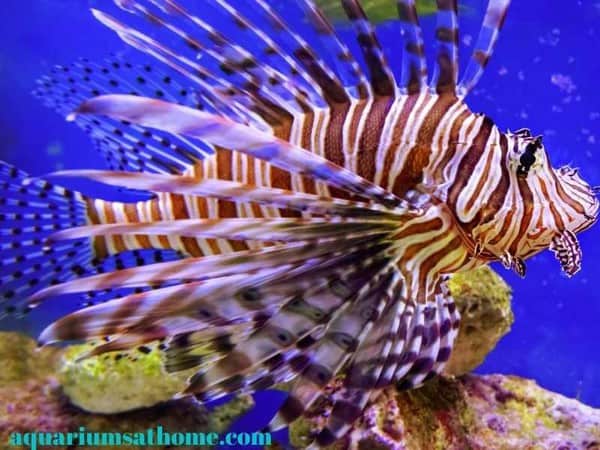
How to Maintain a Reef Tank with Lionfish?
For a reef tank, you must keep the water as clean as possible otherwise, the corals will begin to die off. Lionfish are notoriously messy – they eat a lot of food and thus secrete a lot of waste. Both factors are detrimental to maintaining the ideal water parameters needed for a reef tank.
A good filtration system such as a hang-on power filter, canister filter, or wet-dry system is a must as are regular partial water changes. As to how much and how often to change the water, check out the handy guideline included below:
- tanks up to 40 gallons – 5% weekly
- tanks 40 to 90 gallons – 15% bi-weekly
- tanks 100+ gallons – 20% monthly
As well, keeping larger, herbivorous fish like tangs in a reef tank with lionfish will help keep it clean. They’ll pick away at the algae growing on the corals to prevent overpopulation. Just make sure not to overcrowd the tank as this too will negatively affect both the water conditions and the social dynamics.
What Tank Conditions are Best for Lionfish?
Lionfish range in size from 6 to 18 in length, depending on the species, of course. They do best alone or in a male/female pair in a large tank that holds at least 50 gallons of water. Since they’re found near coral reefs in the tropical waters of the South Pacific, a warm tank with plenty of rocks is ideal.
The water temperature should be somewhere between 72- and 78-degrees Fahrenheit with a pH ranging from 8.1 to 8.4 and a salinity of 1.020 to 1.026. Stable water conditions are of the utmost importance therefore, the temperature, pH level, and salinity must be balanced and regulated properly.
The aquarium should be equipped with a light, filter, heater, and air pump. You’ll also need a protein skimmer and hydrometer if you have a reef tank set-up. The water should be tested weekly and water changes done as needed, depending on the size of the tank and how well-established it is.
Are Lionfish Easy to Care for?
Lionfish are quite hardy and moderately easy to care for overall – once you know exactly what they need, that is. They’re not recommended for beginners as they require a lot of time and care in terms of tank maintenance. They’re expensive to purchase (between $35 and $85 each, depending on the type) and also more costly to feed since they’re voracious carnivores and need plenty of food to survive.
Being a venomous fish, you need to be aware of their surroundings when doing routine water changes. If not, you could get stung with the pain equivalent to that of a bee sting. Though not deadly to humans, the venom can cause an allergic reaction such as anaphylaxis. In a captive environment that’s both well-maintained and stress-free, a lionfish can live anywhere from 10 to 15 years easily.
Conclusion
To conclude, although lionfish are a predatory reef fish, they’re not the best choice for a reef tank with corals or other invertebrates. If you have smaller fish in your marine aquarium, a lionfish won’t hesitate to devour them. The lack of shellfish in a reef tank will negatively affect the health or ecological balance of that aquatic environment.
I hope this article has provided with the information you seek regarding keeping lionfish in a reef tank. Thanks for reading and good luck with your aquarium hobby.
Related Posts
Is a Cowfish a Saltwater Fish?
What Saltwater Fish Can Live in a 5-Gallon Tank
Reef Safe Fish for 30 Gallon Tank
Reef Safe Fish for a 55 Gallon Tank?
These are the Most Fun Fish to Own?
How to Get Rid of Bristle Worms?



